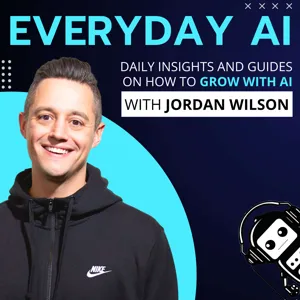Podcast Summary
AI's potential to reduce productivity gap between less and more skilled workers: A recent study suggests AI could help reverse decades-long trend of increasing inequality by narrowing the productivity gap between less and more skilled workers
Artificial intelligence (AI), as represented by ChatGPT, has been making waves since its public release six months ago with its ability to perform various tasks from writing raps to identifying bugs in computer code. However, the widespread use of AI has also raised concerns about job displacement, derailing democracy, and even potential harm to humanity. A recent study, however, offers a glimmer of hope as it shows that AI can help narrow the productivity gap between less skilled and more skilled workers, potentially reversing the trend of increasing inequality that has been ongoing for decades. This finding, according to labor economist David Autor, is significant as most research suggests that computers have been a major driver of inequality for decades. The implications of this new technological era are vast, and it remains to be seen whether AI could indeed be a force for greater equality. This conversation between Nick Fountain and David Auter, originally from NPR's Planet Money, offers valuable insights into this important and timely topic.
The Industrial Revolution: A Turning Point for Skills and Jobs: The Industrial Revolution led to the displacement of artisanal skills but created well-paid jobs for those with basic education and competency. Today, with the rise of AI, it's crucial to adapt and prepare for the future of work.
The industrial revolution marked a turning point in history when technology led to significant changes in the economy and workforce. Prior to this era, artisans performed various steps in creating products, but the advent of mass production led to the displacement of many artisanal skills. Initially, factory jobs required less skill and paid less, but as technology advanced, more complex machines were used to produce goods, leading to a need for workers with greater expertise. This created a "golden era" where people with basic education could find well-paid jobs in factories and offices, as these roles required a certain level of knowledge and competency. This shift contributed to the growth of the middle class. Today, as we face another technological revolution with AI, it's essential to consider its potential impact on the future of work and adapt accordingly. To learn more about the role of AI in the economy and how to prepare for the future, visit globallexetf.com.
Impact of Technology on Job Market and Inequality: Recent research suggests that AI might reverse the trend of technology devaluing middle-skill jobs and instead complement the bottom end of the workforce
Technological advancements, such as the Industrial Revolution and the Computer Era, have led to significant changes in the job market and increased inequality. While technology created new opportunities for middle-skill workers during the Industrial Revolution, it later automated those jobs during the Computer Era, leading to a devaluation of mass expertise and a surge in demand for elite expertise. However, recent research suggests that the latest technological advancements, like AI, might be reversing this trend. A study on a software company's workforce found that only lower-skilled workers benefited from the use of AI, while more experienced higher-skilled workers saw little to no benefit. This shift could potentially signal a new era in which technology complements the bottom instead of the top, but more research is needed to confirm this trend. Overall, the impact of technology on the job market and inequality is complex and constantly evolving.
AI making everyone more productive: AI tools like ChatGPT save time and make people more efficient, reducing productivity inequality and benefiting the middle class
AI has the potential to reduce productivity inequality by making everyone more productive, especially those who are less skilled. According to two empirical studies, AI tools like ChatGPT can save time and make people more efficient, bringing the productivity of less skilled workers up to average levels and slightly improving the performance of excellent workers. This scenario is beneficial for the middle class and could potentially rebuild it by making elite expertise more accessible and affordable. The use of AI in industries like healthcare, where nurse practitioners have expanded their roles, serves as an example of how this could work. However, it's crucial to make this scenario a reality by continuing to develop and implement AI tools that empower middle-skill workers and enable them to use AI to enhance their expertise.
The Impact of AI on the Labor Market: AI can displace certain jobs but also create new opportunities, requiring smart policy, private initiatives, philanthropy, and university involvement to manage the transition and mitigate negative impacts
The labor market is undergoing significant changes due to advancements in technology, particularly Artificial Intelligence (AI). This can lead to the displacement of certain jobs, even those currently held by high-earning experts. However, it also has the potential to lift many workers back into the middle class by enabling them to perform tasks previously reserved for the elite. This is not a zero-sum game, as increased productivity can lead to overall wealth creation. However, smart government policy, private sector initiatives, philanthropy, and universities will be crucial in managing this transition and mitigating potential negative impacts. It's important to remember that this process will unfold gradually and not result in a sudden, catastrophic upheaval. While the future may bring challenges, it also holds opportunities for growth and progress.
Balancing the benefits of automation with the need to value labor: Automation is necessary to meet the needs of an aging population and maintain productivity, but it can also lead to increased inequality and the devaluation of certain types of expertise. It's crucial to strike a balance and consider the impact on workers and the potential for a widening wealth gap.
While AI and automation have the potential to bring about significant economic changes, including increased inequality and the devaluation of certain types of expertise, we are currently in a period of labor scarcity due to demographic trends and population aging. This means that automation will be necessary to meet the needs of an aging population and to maintain productivity. However, it's important to recognize that the devaluation of expertise can have negative consequences, as the example of London taxi cab drivers illustrates. While consumers may benefit from the convenience and efficiency of AI and automation, it's crucial to consider the impact on workers and the potential for a widening wealth gap. Overall, it's essential to strike a balance between the benefits of automation and the need to value and protect expertise and labor.
Human skills AI can't replicate: Despite AI's potential to devalue certain human skills, unique abilities like adaptability, common sense, and human connection keep us valuable in the marketplace. However, ethical considerations and potential risks, such as misinformation and autonomous weapons, must be addressed.
While AI has the potential to devalue certain human skills and expertise, particularly in the labor market, there are still advantages to being human that cannot be replicated by machines. David Otter, a researcher at the Oxford Internet Institute, believes that humans have unique abilities such as adaptability, common sense, and the ability to relate to others, which will keep us valuable in the marketplace. However, there are also concerns about how AI could be misused in dangerous ways, from misinformation to autonomous weapons. Ultimately, Otter remains hopeful that AI can help rebuild the middle class if used wisely, but it's important to be aware of the potential risks and ethical considerations. In the end, the future of AI is uncertain, but it's essential to have an ongoing conversation about its implications for society.





